- Home
- William Styron
Darkness Visible Page 4
Darkness Visible Read online
Page 4
That fall, as the disorder gradually took full possession of my system, I began to conceive that my mind itself was like one of those outmoded small-town telephone exchanges, being gradually inundated by flood-waters: one by one, the normal circuits began to drown, causing some of the functions of the body and nearly all of those of instinct and intellect to slowly disconnect.
There is a well-known checklist of some of these functions and their failures. Mine conked out fairly close to schedule, many of them following the pattern of depressive seizures. I particularly remember the lamentable near disappearance of my voice. It underwent a strange transformation, becoming at times quite faint, wheezy and spasmodic—a friend observed later that it was the voice of a ninety-year-old. The libido also made an early exit, as it does in most major illnesses—it is the superfluous need of a body in beleaguered emergency. Many people lose all appetite; mine was relatively normal, but I found myself eating only for subsistence: food, like everything else within the scope of sensation, was utterly without savor. Most distressing of all the instinctual disruptions was that of sleep, along with a complete absence of dreams.
Exhaustion combined with sleeplessness is a rare torture. The two or three hours of sleep I was able to get at night were always at the behest of the Halcion—a matter which deserves particular notice. For some time now many experts in psychopharmacology have warned that the benzodiazepine family of tranquilizers, of which Halcion is one (Valium and Ativan are others), is capable of depressing mood and even precipitating a major depression. Over two years before my siege, an insouciant doctor had prescribed Ativan as a bedtime aid, telling me airily that I could take it as casually as aspirin. The Physicians’ Desk Reference, the pharmacological bible, reveals that the medicine I had been ingesting was (a) three times the normally prescribed strength, (b) not advisable as a medication for more than a month or so, and (c) to be used with special caution by people of my age. At the time of which I am speaking I was no longer taking Ativan but had become addicted to Halcion and was consuming large doses. It seems reasonable to think that this was still another contributory factor to the trouble that had come upon me. Certainly, it should be a caution to others.
At any rate, my few hours of sleep were usually terminated at three or four in the morning, when I stared up into yawning darkness, wondering and writhing at the devastation taking place in my mind, and awaiting the dawn, which usually permitted me a feverish, dreamless nap. I’m fairly certain that it was during one of these insomniac trances that there came over me the knowledge—a weird and shocking revelation, like that of some long-beshrouded metaphysical truth—that this condition would cost me my life if it continued on such a course. This must have been just before my trip to Paris. Death, as I have said, was now a daily presence, blowing over me in cold gusts. I had not conceived precisely how my end would come. In short, I was still keeping the idea of suicide at bay. But plainly the possibility was around the corner, and I would soon meet it face to face.
What I had begun to discover is that, mysteriously and in ways that are totally remote from normal experience, the gray drizzle of horror induced by depression takes on the quality of physical pain. But it is not an immediately identifiable pain, like that of a broken limb. It may be more accurate to say that despair, owing to some evil trick played upon the sick brain by the inhabiting psyche, comes to resemble the diabolical discomfort of being imprisoned in a fiercely overheated room. And because no breeze stirs this caldron, because there is no escape from this smothering confinement, it is entirely natural that the victim begins to think ceaselessly of oblivion.
V
ONE OF THE MEMORABLE MOMENTS IN MADAME BOVARY is the scene where the heroine seeks help from the village priest. Guilt-ridden, distraught, miserably depressed, the adulterous Emma—heading toward eventual suicide—stumblingly tries to prod the abbé into helping her find a way out of her misery. But the priest, a simple soul and none too bright, can only pluck at his stained cassock, distractedly shout at his acolytes, and offer Christian platitudes. Emma goes on her quietly frantic way, beyond comfort of God or man.
I felt a bit like Emma Bovary in my relationship with the psychiatrist I shall call Dr. Gold, whom I began to visit immediately after my return from Paris, when the despair had commenced its merciless daily drumming. I had never before consulted a mental therapist for anything, and I felt awkward, also a bit defensive; my pain had become so intense that I considered it quite improbable that conversation with another mortal, even one with professional expertise in mood disorders, could alleviate the distress. Madame Bovary went to the priest with the same hesitant doubt. Yet our society is so structured that Dr. Gold, or someone like him, is the authority to whom one is forced to turn in crisis, and it is not entirely a bad idea, since Dr. Gold—Yale-trained, highly qualified—at least provides a focal point toward which one can direct one’s dying energies, offers consolation if not much hope, and becomes the receptacle for an outpouring of woes during fifty minutes that also provides relief for the victim’s wife. Still, while I would never question the potential efficacy of psychotherapy in the beginning manifestations or milder forms of the illness—or possibly even in the aftermath of a serious onslaught—its usefulness at the advanced stage I was in has to be virtually nil. My more specific purpose in consulting Dr. Gold was to obtain help through pharmacology—though this too was, alas, a chimera for a bottomed-out victim such as I had become.
He asked me if I was suicidal, and I reluctantly told him yes. I did not particularize—since there seemed no need to—did not tell him that in truth many of the artifacts of my house had become potential devices for my own destruction: the attic rafters (and an outside maple or two) a means to hang myself, the garage a place to inhale carbon monoxide, the bathtub a vessel to receive the flow from my opened arteries. The kitchen knives in their drawers had but one purpose for me. Death by heart attack seemed particularly inviting, absolving me as it would of active responsibility, and I had toyed with the idea of self-induced pneumonia—a long, frigid, shirt-sleeved hike through the rainy woods. Nor had I overlooked an ostensible accident, à la Randall Jarrell, by walking in front of a truck on the highway nearby. These thoughts may seem outlandishly macabre—a strained joke—but they are genuine. They are doubtless especially repugnant to healthy Americans, with their faith in self-improvement. Yet in truth such hideous fantasies, which cause well people to shudder, are to the deeply depressed mind what lascivious daydreams are to persons of robust sexuality. Dr. Gold and I began to chat twice weekly, but there was little I could tell him except to try, vainly, to describe my desolation.
Nor could he say much of value to me. His platitudes were not Christian but, almost as ineffective, dicta drawn straight from the pages of The Diagnostic and Statistical Manual of the American Psychiatric Association (much of which, as I mentioned earlier, I’d already read), and the solace he offered me was an antidepressant medication called Ludiomil. The pill made me edgy, disagreeably hyperactive, and when the dosage was increased after ten days, it blocked my bladder for hours one night. Upon informing Dr. Gold of this problem, I was told that ten more days must pass for the drug to clear my system before starting anew with a different pill. Ten days to someone stretched on such a torture rack is like ten centuries—and this does not begin to take into account the fact that when a new pill is inaugurated several weeks must pass before it becomes effective, a development which is far from guaranteed in any case.
This brings up the matter of medication in general. Psychiatry must be given due credit for its continuing struggle to treat depression pharmacologically. The use of lithium to stabilize moods in manic depression is a great medical achievement; the same drug is also being employed effectively as a preventive in many instances of unipolar depression. There can be no doubt that in certain moderate cases and some chronic forms of the disease (the so-called endogenous depressions) medications have proved invaluable, often altering the course of a serious disturba
nce dramatically. For reasons that are still not clear to me, neither medications nor psychotherapy were able to arrest my plunge toward the depths. If the claims of responsible authorities in the field can be believed—including assertions made by physicians I’ve come to know personally and to respect—the malign progress of my illness placed me in a distinct minority of patients, severely stricken, whose affliction is beyond control. In any case, I don’t want to appear insensitive to the successful treatment ultimately enjoyed by most victims of depression. Especially in its earlier stages, the disease yields favorably to such techniques as cognitive therapy—alone, or in combination with medications—and other continually evolving psychiatric strategies. Most patients, after all, do not need to be hospitalized and do not attempt or actually commit suicide. But until that day when a swiftly acting agent is developed, one’s faith in a pharmacological cure for major depression must remain provisional. The failure of these pills to act positively and quickly—a defect which is now the general case—is somewhat analogous to the failure of nearly all drugs to stem massive bacterial infections in the years before antibiotics became a specific remedy. And it can be just as dangerous.
So I found little of worth to anticipate in my consultations with Dr. Gold. On my visits he and I continued to exchange platitudes, mine haltingly spoken now—since my speech, emulating my way of walking, had slowed to the vocal equivalent of a shuffle—and I’m sure as tiresome as his.
Despite the still-faltering methods of treatment, psychiatry has, on an analytical and philosophical level, contributed a lot to an understanding of the origins of depression. Much obviously remains to be learned (and a great deal will doubtless continue to be a mystery, owing to the disease’s idiopathic nature, its constant interchangeability of factors), but certainly one psychological element has been established beyond reasonable doubt, and that is the concept of loss. Loss in all of its manifestations is the touchstone of depression—in the progress of the disease and, most likely, in its origin. At a later date I would gradually be persuaded that devastating loss in childhood figured as a probable genesis of my own disorder; meanwhile, as I monitored my retrograde condition, I felt loss at every hand. The loss of self-esteem is a celebrated symptom, and my own sense of self had all but disappeared, along with any self-reliance. This loss can quickly degenerate into dependence, and from dependence into infantile dread. One dreads the loss of all things, all people close and dear. There is an acute fear of abandonment. Being alone in the house, even for a moment, caused me exquisite panic and trepidation.
Of the images recollected from that time the most bizarre and discomfiting remains the one of me, age four and a half, tagging through a market after my long-suffering wife; not for an instant could I let out of my sight the endlessly patient soul who had become nanny, mommy, comforter, priestess, and, most important, confidante—a counselor of rocklike centrality to my existence whose wisdom far exceeded that of Dr. Gold. I would hazard the opinion that many disastrous sequels to depression might be averted if the victims received support such as she gave me. But meanwhile my losses mounted and proliferated. There is no doubt that as one nears the penultimate depths of depression—which is to say just before the stage when one begins to act out one’s suicide instead of being a mere contemplator of it—the acute sense of loss is connected with a knowledge of life slipping away at accelerated speed. One develops fierce attachments. Ludicrous things—my reading glasses, a handkerchief, a certain writing instrument—became the objects of my demented possessiveness. Each momentary misplacement filled me with a frenzied dismay, each item being the tactile reminder of a world soon to be obliterated.
November wore on, bleak, raw and chill. One Sunday a photographer and his assistants came to take pictures for an article to be published in a national magazine. Of the session I can recall little except the first snowflakes of winter dotting the air outside. I thought I obeyed the photographer’s request to smile often. A day or two later the magazine’s editor telephoned my wife, asking if I would submit to another session. The reason he advanced was that the pictures of me, even the ones with smiles, were “too full of anguish.”
I had now reached that phase of the disorder where all sense of hope had vanished, along with the idea of a futurity; my brain, in thrall to its outlaw hormones, had become less an organ of thought than an instrument registering, minute by minute, varying degrees of its own suffering. The mornings themselves were becoming bad now as I wandered about lethargic, following my synthetic sleep, but afternoons were still the worst, beginning at about three o’clock, when I’d feel the horror, like some poisonous fogbank, roll in upon my mind, forcing me into bed. There I would lie for as long as six hours, stuporous and virtually paralyzed, gazing at the ceiling and waiting for that moment of evening when, mysteriously, the crucifixion would ease up just enough to allow me to force down some food and then, like an automaton, seek an hour or two of sleep again. Why wasn’t I in a hospital?
VI
FOR YEARS I HAD KEPT A NOTEBOOK—NOT STRICTLY a diary, its entries were erratic and haphazardly written—whose contents I would not have particularly liked to be scrutinized by eyes other than my own. I had hidden it well out of sight in my house. I imply no scandalousness; the observations were far less raunchy, or wicked, or self-revealing, than my desire to keep the notebook private might indicate. Nonetheless, the small volume was one that I fully intended to make use of professionally and then destroy before the distant day when the specter of the nursing home came too near. So as my illness worsened I rather queasily realized that if I once decided to get rid of the notebook that moment would necessarily coincide with my decision to put an end to myself. And one evening during early December this moment came.
That afternoon I had been driven (I could no longer drive) to Dr. Gold’s office, where he announced that he had decided to place me on the antidepressant Nardil, an older medication which had the advantage of not causing the urinary retention of the other two pills he had prescribed. However, there were drawbacks. Nardil would probably not take effect in less than four to six weeks—I could scarcely believe this—and I would have to carefully obey certain dietary restrictions, fortunately rather epicurean (no sausage, no cheese, no pâté de foie gras), in order to avoid a clash of incompatible enzymes that might cause a stroke. Further, Dr. Gold said with a straight face, the pill at optimum dosage could have the side effect of impotence. Until that moment, although I’d had some trouble with his personality, I had not thought him totally lacking in perspicacity; now I was not at all sure. Putting myself in Dr. Gold’s shoes, I wondered if he seriously thought that this juiceless and ravaged semi-invalid with the shuffle and the ancient wheeze woke up each morning from his Halcion sleep eager for carnal fun.
There was a quality so comfortless about that day’s session that I went home in a particularly wretched state and prepared for the evening. A few guests were coming over for dinner—something which I neither dreaded nor welcomed and which in itself (that is, in my torpid indifference) reveals a fascinating aspect of depression’s pathology. This concerns not the familiar threshold of pain but a parallel phenomenon, and that is the probable inability of the psyche to absorb pain beyond predictable limits of time. There is a region in the experience of pain where the certainty of alleviation often permits superhuman endurance. We learn to live with pain in varying degrees daily, or over longer periods of time, and we are more often than not mercifully free of it. When we endure severe discomfort of a physical nature our conditioning has taught us since childhood to make accommodations to the pain’s demands—to accept it, whether pluckily or whimpering and complaining, according to our personal degree of stoicism, but in any case to accept it. Except in intractable terminal pain, there is almost always some form of relief; we look forward to that alleviation, whether it be through sleep or Tylenol or self-hypnosis or a change of posture or, most often, through the body’s capacity for healing itself, and we embrace this eventual respite as
the natural reward we receive for having been, temporarily, such good sports and doughty sufferers, such optimistic cheerleaders for life at heart.
In depression this faith in deliverance, in ultimate restoration, is absent. The pain is unrelenting, and what makes the condition intolerable is the foreknowledge that no remedy will come—not in a day, an hour, a month, or a minute. If there is mild relief, one knows that it is only temporary; more pain will follow. It is hopelessness even more than pain that crushes the soul. So the decision-making of daily life involves not, as in normal affairs, shifting from one annoying situation to another less annoying—or from discomfort to relative comfort, or from boredom to activity—but moving from pain to pain. One does not abandon, even briefly, one’s bed of nails, but is attached to it wherever one goes. And this results in a striking experience—one which I have called, borrowing military terminology, the situation of the walking wounded. For in virtually any other serious sickness, a patient who felt similar devastation would be lying flat in bed, possibly sedated and hooked up to the tubes and wires of life-support systems, but at the very least in a posture of repose and in an isolated setting. His invalidism would be necessary, unquestioned and honorably attained. However, the sufferer from depression has no such option and therefore finds himself, like a walking casualty of war, thrust into the most intolerable social and family situations. There he must, despite the anguish devouring his brain, present a face approximating the one that is associated with ordinary events and companionship. He must try to utter small talk, and be responsive to questions, and knowingly nod and frown and, God help him, even smile. But it is a fierce trial attempting to speak a few simple words.

 Selected Letters of William Styron
Selected Letters of William Styron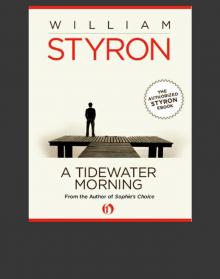 A Tidewater Morning
A Tidewater Morning Sophie's Choice
Sophie's Choice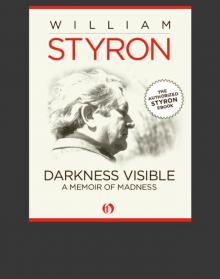 Darkness Visible: A Memoir of Madness
Darkness Visible: A Memoir of Madness My Generation: Collected Nonfiction
My Generation: Collected Nonfiction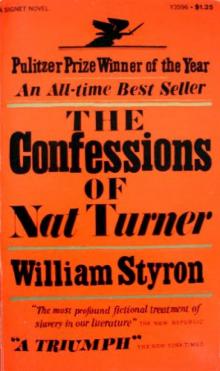 The Confessions of Nat Turner
The Confessions of Nat Turner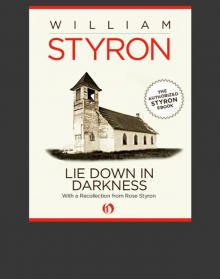 Lie Down in Darkness
Lie Down in Darkness The Suicide Run: Five Tales of the Marine Corps
The Suicide Run: Five Tales of the Marine Corps Set This House on Fire
Set This House on Fire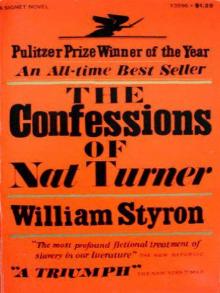 Confessions of Nat Turner
Confessions of Nat Turner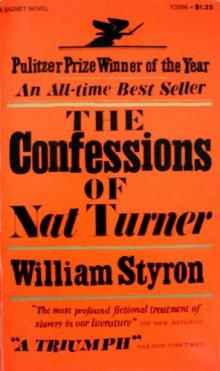 The Confessions of Nat Turner (1968 Pulitzer Prize)
The Confessions of Nat Turner (1968 Pulitzer Prize) The Suicide Run
The Suicide Run My Generation
My Generation Sophie's Choice (Open Road)
Sophie's Choice (Open Road)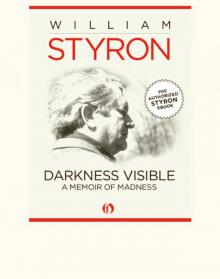 Darkness Visible
Darkness Visible